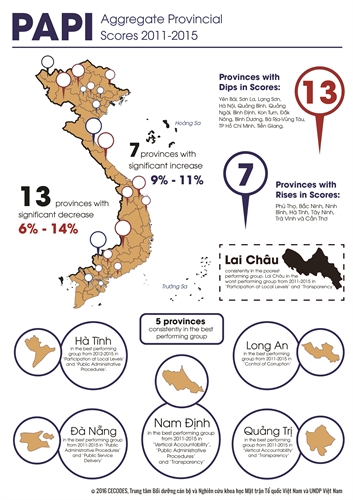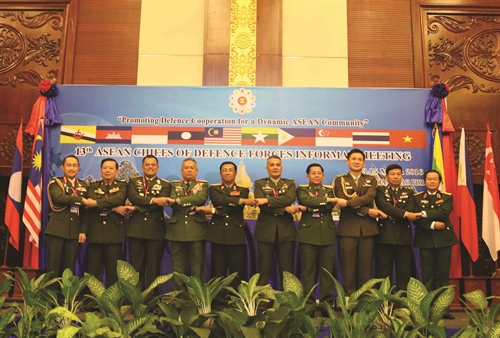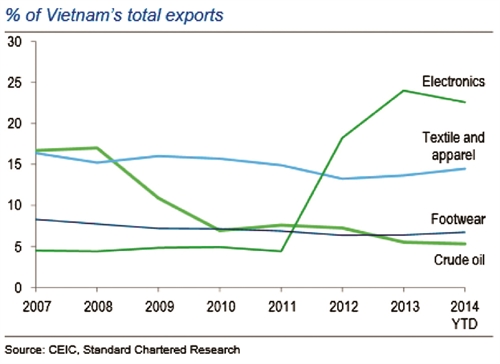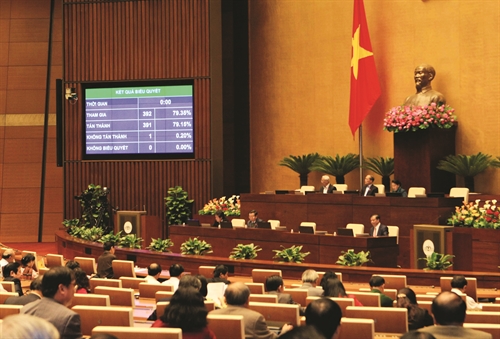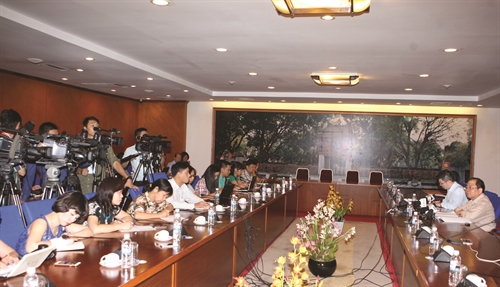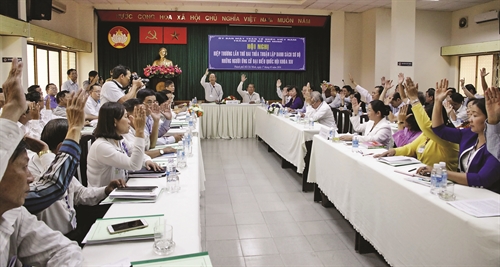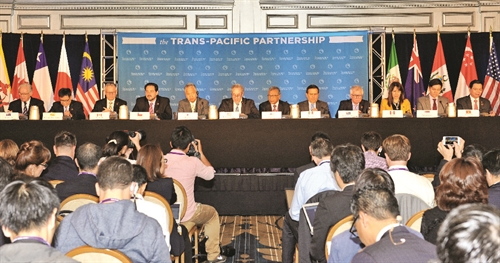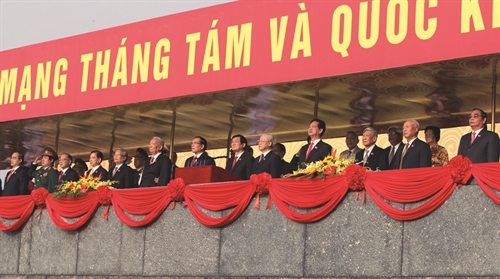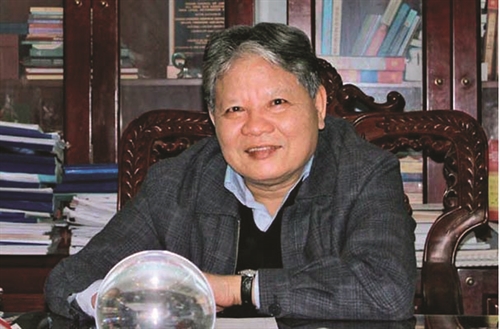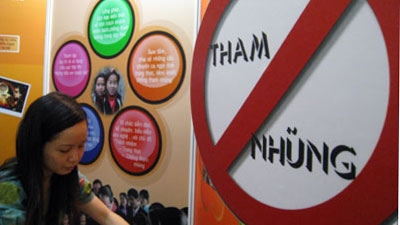In a report presented at the 11th session, the last gathering of the 13th Legislature, National Assembly Chairman Nguyen Sinh Hung said over the past five years the National Assembly delivered a huge volume of work, promulgating a new constitution and numerous laws, deciding on key national issues and renovating supreme oversight activities.
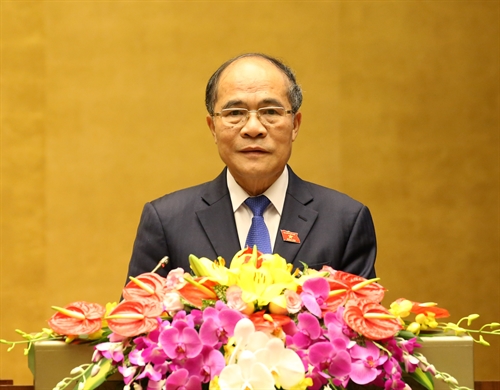 |
Legislative work
During its 13th tenure, the National Assembly passed the 2013 Constitution and basically completed the legal system in conformity with the Constitution, the National Assembly leader said.
The 2013 Constitution was the one of a period of comprehensive renewal in both economic and political fields that met the requirements of national construction and defense and international integration. It inherited and developed the core and fundamental values of the 1946, 1959, 1980 and 1992 Constitutions, Hung said.
He assessed that the National Assembly and every deputy had worked dedicatedly, responsibly and scientifically in listening to and absorbing the opinions of the people at home and abroad in the drafting process.
The Constitution upheld human rights and citizens’ basic rights and obligations and promoted the role of the people in exercising political, civil, economic, cultural and social rights. It also established legislative, executive and judicial powers and laid down fundamental principles for renewing and perfecting the state apparatus, ensuring the assignment, coordination and control of state power.
During more than two years since the promulgation of the Constitution, the National Assembly adopted nearly 70 codes and laws concretizing the spirit of the Constitution in most areas of social and economic life.
The lawmaking process, as assessed by Chairman Hung, saw many improvements toward raising the quality and specificity of legal documents and increasing democracy, publicity and transparency. The new Law on Promulgation of Legal Documents created a legal framework for improving the quality and efficiency of legislative activities.
The National Assembly leader also pointed out weaknesses in legislative activities, such as frequent changes in the legislative programs, unsatisfactory quality of some bills, and late issuance of implementing regulations.
He said these weaknesses were partly due to the changing social and economic relations in the country, to the responsibility of drafting agencies and to the lack of an effective mechanism to involve experts and scientists in the drafting process.
Deciding on key national issues
During the past five years, the National Assembly spent much time discussing, listening to and assimilating opinions of different authorities as well as voters nationwide, and timely issued decisions and policies coping with the country’s difficulties and challenges, the National Assembly Chairman reported.
It adopted many important resolutions on socio-economic development tasks and adjusted many times socio-economic development objectives and plans to match reality. It also set forth specific targets and tasks for legislative, executive and judicial bodies.
Chairman Hung assessed that the Legislature promptly issued suitable policies in response to the practical situation, such as maintaining prudent and flexible monetary and financial policies and cutting unnecessary and ineffective expenditures. It approved drastic solutions to ensure national financial security, stabilize the macro economy, control inflation, recover economic growth, and ensure social security. Many decisions were adopted to address pressing social issues, such as management of the planning, construction and operation of hydropower projects and reservoirs, crime fighting, support for building of offshore fishing ships, safeguarding of sovereignty over seas and islands, building of new countryside, and support for the disadvantaged.
The National Assembly leader held that respect for and close attachment to the people were explicitly demonstrated in the decision making process of the National Assembly during the past tenure. Every opinion of legislators at the forum stemmed from the daily life, feelings, aspirations and will of the people.
Speaking about weaknesses in this working area, Chairman Hung said the process and procedures for considering and deciding on key issues remained incomplete and inconsistent; supervision and inspection of the implementation process was not strict, and legislators were not quite well-informed in some cases.
Renovating supreme oversight activities
In his report, the National Assembly leader assessed that oversight activities resulted in substantial changes in the operation of the state apparatus from the central to grassroots level, ensuring strict observance of law. At the same time, through these activities, limitations and weaknesses in administration work were discovered and addressed.
The National Assembly’s question-and-answer sessions were much renovated in the spirit of constructiveness, democracy, publicity, debate, dialogue, responsibility and self-criticism of questioned officials. Specialized oversight was increased, focusing on important and urgent issues. Oversight resolutions and recommendations correctly addressed practical issues and were strictly implemented with remarkable results.
Chairman Hung reported that “re-oversight” activities were also regularly carried out to examine results of implementation of the National Assembly’s resolutions on question-and-answer activities. Under this mechanism, results of fulfillment of promises and solutions presented at a National Assembly session would be reported at the subsequent one. Especially, at the 10th session, legislators questioned heads of state agencies about the implementation of the National Assembly’s resolutions on specialized oversight and question-and-answer activities from the beginning of the tenure.
Questioning sessions were also held more regularly at the Ethnic Council and various Committees of the National Assembly, which achieved practical results in enhancing the responsibility of the Council and Committees, as well as of ministries and sectors for supervising and organizing law enforcement, and increasing the transparency and publicity of state agencies’ activities.
During this tenure, the National Assembly, on behalf of the people nationwide, exercised twice the supreme oversight power through collecting votes of confidence on key leading officials elected or approved by the National Assembly. The results of votes of confidence served as a benchmark for these officials to unceasingly foster their moral and professional qualities and raise their working capacity and efficiency, bringing about marked progress in some fields and sectors.
The National Assembly Chairman, however, remarked that there remained not a few limitations in the National Assembly’s oversight activities. In some cases, legislators had no mechanism for clearly determining responsibilities of related people and agencies and handling their wrongdoings. The monitoring and urging of the implementation of oversight conclusions and recommendations was not resolute, leading to the delayed settlement of many cases. The settlement of voters’ petitions, complaints and denunciations was unsatisfactory. The supervision of the enforcement of anti-corruption, thrift practice and waste combat laws was poor. Some regulations relating to oversight activities such as dismissal of National Assembly deputies by voters or casting of votes of confidence on National Assembly-elected or approved officials remained on paper.
Reviewing external activities of the National Assembly over the past five years, the top legislator said the National Assembly actively and responsibly participated in global and regional inter-parliamentary forums, contributing to maintaining peace and stability while promoting dialogue and cooperation.
As a member of many parliamentary organizations, the Legislature not only made active contributions to these organizations’ activities but also put forward initiatives and constructive recommendations aiming to boost effective cooperation.
Vietnam successfully organized the 132nd Assembly of the Inter-parliamentary Union with the adoption of the Hanoi Declaration, Chairman Hung stressed.
The National Assembly also promoted multifaceted cooperation with parliaments of other countries, with priority given to boosting relations with Vietnam’s key and traditional partners like Laos, Cambodia, China, the Russian Federation, the United States, Japan, the Republic of Korea, and the European Parliament.
At the same time, the National Assembly leader reported that right from the beginning of the tenure, the National Assembly decided on a number of practical measures to raise the quality and effectiveness of its activities.
These measures brought about positive effects in the National Assembly’s activities, Chairman Hung assessed.
Particularly, the application of information technology to the supply of documents at National Assembly sessions and National Assembly Standing Committee meetings and to the provision of information for National Assembly deputies and the public about the National Assembly’s activities yielded positive results.
Openness and transparency in the National Assembly’s activities were increased. The launch of the National Assembly’s television channel, increase of the time for live broadcasting of plenary sessions and question-and-answer sessions of the National Assembly and its Standing Committee brought the National Assembly’s activities closer to the people, enabling voters to supervise activities of the National Assembly and its deputies and of state agencies.
Lessons learnt
Citing lessons drawn from the 13th tenure, the National Assembly leader called for upholding the sense of solidarity, continuing with vigorous renewal, democracy, and openness and transparency in organization and operation, which he said, is a driving force for strength, creativity and dynamism to fulfill assigned tasks.
Each National Assembly deputy was urged to be close to voters and the public, listening to their opinions and suggestions, so that the Legislature’s decisions are made promptly, matching realities and meeting voters’ need.
According to Chairman Hung, the legislators’ quality plays a deciding role in improving the National Assembly’s capacity.
Full-time lawmakers increasingly performed their role as a core force in the National Assembly’s activities, he said.
Furthermore, increased coordination with the President, the cabinet, the Central Committee of the Vietnam Fatherland Front, the Supreme People’s Court, the Supreme People’s Procuracy and related agencies would generate a combined strength to help the National Assembly fulfill all assigned tasks.
The top legislator pointed out that the biggest lesson for National Assembly deputies in the capacity as representatives of the people was to serve the people as taught by late President Ho Chi Minh. Over the past five years, all activities of the National Assembly and its agencies and deputies were aimed at serving the country and the people. Being trusted, loved, supported, criticized and supervised by the people is the source of the power of the National Assembly, he said.- (VLLF)
